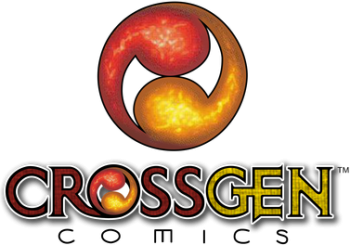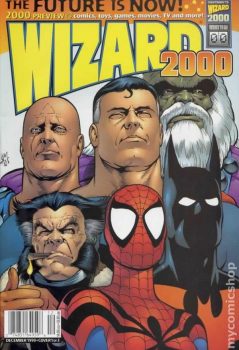The debate has been raging on for years now: What will comics be like in the years ahead, if they survive at all?
When I come across someone, often an expert in another industry, who enters into comics and says they know how to “fix” what’s wrong with comic books, I’m worried these days.
Several of them have poured boatloads of cash into these endeavors, and so far I haven’t noticed any change in how things are being done, honestly.
But still contenders make their presence known and take their shots. Some are at it even now.
THE NEW GUYS
 The latest one I’ve found is called Limit Break Comics, “a Dublin-based comic collective, founded on the back of a shared desire to see small press comics grow in Ireland,” according to their website. The reason I was intrigued by them was their announcement of a new sci-fi anthology book that debuted this past weekend at the Dublin Comic Con called Plexus. I’m always intrigued by science fiction, and I wish I had noticed it when it was on Kickstarter recently.
The latest one I’ve found is called Limit Break Comics, “a Dublin-based comic collective, founded on the back of a shared desire to see small press comics grow in Ireland,” according to their website. The reason I was intrigued by them was their announcement of a new sci-fi anthology book that debuted this past weekend at the Dublin Comic Con called Plexus. I’m always intrigued by science fiction, and I wish I had noticed it when it was on Kickstarter recently.
I’m anxious to hear how Plexus was received over the weekend. If I find a digital copy I can purchase online, I’ll give it a whirl. I’m intrigued by their other books called Meouch, MixTape and Life & Death.
While I was researching LB Comics (as they are known), I ran across another “new” company called AWA, which stands for Artists, Writers and Artisans. There are several familiar names associated with this group, including former Marvel publisher Bill Jemas, former Marvel EiC Axel Alonso, and creators Peter Milligan, Frank Cho, Christa Faust, ACO, Garth Ennis, and J. Michael Straczynski.
From what I can tell, they launched back in March of this year. Their goal is to set up what they refer to as “a combination of shared superhero universe and Image-style standalone titles.” They also say it is “an entirely new, cohesive, shared comics universe.”
Their first titles will be called Fight Girls, Archangel 8, Bad Mother and American Ronin. However, they recently announced a title intended to launch all those books called The Resistance, about teen heroes and written by Straczyinski with art from Mike Deodato, Jr.
Then, too, I had picked up Ignited #1 from Humanoids at my local shop a few months back. Since that time, I haven’t been able to locate any more issues of Ignited in stores within a hundred miles of the one I got that initial book in. None of their other books have been in this region either, including Twisted Tales, Shanghai Dream, and Strangelands. I suppose I could buy digital versions of these books, but some I still want in paper formats!
If you go to their website, they say that “from the beginning, Humanoids has embodied creative innovation, a fiercely independent spirit, and a drive to break new ground.”
There’s that word “new” yet again! And I’m sure there are other companies out there that I simply haven’t come across with the same “new” focus. I don’t know if I have enough money to keep up with all of these books as well as Marvel’s current attempt to flood the market. I still feel for Valiant, who has been making great books for years and yet still hasn’t cracked into several local shops.
THE FIRST TIME I HEARD THIS KIND OF APPROACH
 All this makes me harken back to 1998 when a company called CrossGen (later Cross Generation Entertainment) started publishing. It was located in Tampa, Florida, and Mark Alessi was the founder. He attracted many “name” creators such as Barbara Kesel, Mark Waid and Ron Marz to relocate and become salaried employees.
All this makes me harken back to 1998 when a company called CrossGen (later Cross Generation Entertainment) started publishing. It was located in Tampa, Florida, and Mark Alessi was the founder. He attracted many “name” creators such as Barbara Kesel, Mark Waid and Ron Marz to relocate and become salaried employees.
They worked regular office hours, I understand, and that made it tough for creators who worked when the spirit hit them. I had heard one who worked through the night to finish a story, then tried to lay his head down in the morning only to receive a call that he was due in the office immediately! He made it in, but I believe he barely got through that day!
I had bought many of their books, including Crux, Ruse, Sojourn, and The First. As time went along, however, I couldn’t find their titles anywhere. Eventually, leaders seemed to lose interest in pouring more and more cash into the company, and when bankruptcy and other financial difficulties hit, it was eventually bought out by–who else?–the Walt Disney Company (I prefer the word “Conglomerate”) in 2004.
In 2010, Disney re-established the brand through Marvel Comics, announcing that they would revive CrossGen titles. A few made it to the stands, but nothing has happened since, apparently due to lack of interest on the part of Marvel as well as fans.
THEN THERE WAS DIGITAL
 It wasn’t that long ago that digital was going to save the comics industry. With households full of multiple computers, digital versions would end up on many of them instead of having to go through the laborious process of printing and distributing paper copies and forcing fans to drive to local stores.
It wasn’t that long ago that digital was going to save the comics industry. With households full of multiple computers, digital versions would end up on many of them instead of having to go through the laborious process of printing and distributing paper copies and forcing fans to drive to local stores.
For a long time on my podcast, I would ask comics creators if they thought digital was the future. Nearly all of them were uncertain if digital would even make a dent.
I recently read that Jim Lee at DC had said in interviews that their digital sales had “hit a wall.” I don’t hear much positive from Marvel or other companies regarding digital sales, either, although I still appreciate comiXology as a place to catch up on comics I can’t find in the stands.
NOW WHAT?
 As I look over local comics shops and online sites, I don’t see that much has changed in many years. Collectors still keep many Indie comics afloat, and paper still rules when it comes to how fans prefer to buy their comics.
As I look over local comics shops and online sites, I don’t see that much has changed in many years. Collectors still keep many Indie comics afloat, and paper still rules when it comes to how fans prefer to buy their comics.
Personally, I don’t know that making some external changes to comics is going to impact the industry very much moving forward. I hate to keep repeating myself, but it’s the story that counts. Great storytelling is what gets the attention of fans, in my opinion, not changing people behind the masks. Along with many of my friends, I’m ready to pay more money to get a book that’s engaging on many levels. I enjoy it when my thought processes and my eyes are all tickled. I still don’t think many comics companies understand that. I wish they did.
Different pay scales, specific political outlooks on the right or the left, and flipping costumes haven’t meant new fans. Let’s get back to trying keeping readers engaged with great art and terrific scripting, okay?
What do you think? Has the comics industry just not found the right combination to move into the future with? Do we need more comics companies instead of fewer ones? Does the name of a creator make you want to buy a book rather than strong word of mouth? Whatever your opinions, please be sure to share them in the space below!
Dear Spoilerite,
At Major Spoilers, we strive to create original content that you find interesting and entertaining. Producing, writing, recording, editing, and researching requires significant resources. We pay writers, podcast hosts, and other staff members who work tirelessly to provide you with insights into the comic book, gaming, and pop culture industries. Help us keep MajorSpoilers.com strong. Become a Patron (and our superhero) today.



2 Comments
Lets talk about it for a moment… comics right now are in a mess while there are some bright sparks, most of the comic lines are poor with none of edge of the 80’s, the cool/silly of the 90’s, or the bombast of the 00’s
When a numpty on youtube who has alienated huge chunks of fandom can outsell a vast majority of trades (you know who not naming names) without any of the normal comic press backing him something is rotten in the state of denmark.
Guys blame diversity, but it’s not that they have given these devise characters bad stories and poor art.
Right now this should be a 2nd golden age of comics if the willingness of the big two to let the comics be a crazy idea space for future billion dollar movies.
But to play is safe seems the rule, lets take the reboot of the wildstorm something that could have made a perfect tv show or movie. they had to cancel wildcats again this time as the artist could not shut up on twitter.
And every local comic store I know is kept afloat by sales of funko pops and MTG.
The future is here and comics are not ready.
I think step one would be to get rid of rigid system of “stores need to purchase all their copies from one distributor, two or three months in advance” system. Then, publishers need to diversify their schedule and formats away from “monthly or bi-weekly book of 6 issue arcs, then collected to trade, costs 3-7 buck a piece”. This is very unique to American comics and watching from Europe it seems very bizarre.
Why so rigid? Why is distribution basically a monopoly? Is it all to cater brick and mortar comic stores which cater to diminishing customer base who spend more and more to keep them afloat?
In video games industry these consumers are referred as “whales”, especially in mobile games that include very predatory monetizing practices in form of lootboxes and other microtransactions. Whales produce 90% of revenue, where average customer spends next to nothing. This business model is notoriously short sighted and only exist to make a quick buck, then develop next hopefully big thing to do the same as soon as money flows slows.
Comics are smaller industry and can’t react as quickly as an Asian mobile developers if and when these big spenders diminish. That will be a huge problem in few years. In Europe, comics are in decline too, but it never really relied on same strict formula as in North America. There are and will be plenty of independent creators and small shops to cater the audience for these books. These stores often sell regular books and second hand too to support them, antiquaries style. None of the famous comics from, say France, Italy or Belgium were produced by same kind of industry format, but are regarded as “indie”. These type of creators will be fine.
In Japan, comics are as popular as ever, they never declined. Audiences are probably more traditional and faithful there, but also huge factor is that they cost next to nothing and are and were almost always black and white. This will keep cost down and readers have accepted that decades ago. Its hard to print mainstream books B&W in America, because its seen as lesser quality. There’s also huge indie creator scene: Comiket, twice a year convention built almost exclusively around very small budget fan comics pulls more than a million visitors yearly in Tokyo. Of course, there’s also a downside to Japan’s low prices and high volume: Creators are often young and get paid very little working lots of hours. Basically, every one of them is working like Jack Kirby, with same kind pay as he did in the 60’s.
So, comic publishing has challenges everywhere, but because only North America has so industrialized and few big companies relying system, they have most trouble and worry about what will happen when revenue drops. That’s the nature of corporations.